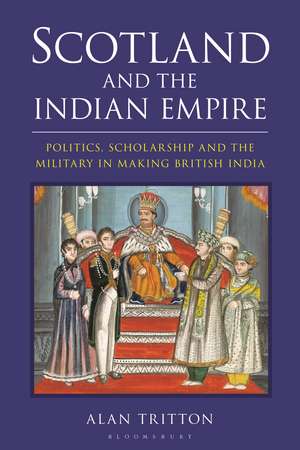Scotland and the Indian Empire: Politics, Scholarship and the Military in Making British India
Autor Alan Trittonen Limba Engleză Hardback – 11 dec 2019
Preț: 204.31 lei
Preț vechi: 334.48 lei
-39% Nou
Puncte Express: 306
Preț estimativ în valută:
39.10€ • 40.39$ • 32.54£
39.10€ • 40.39$ • 32.54£
Carte disponibilă
Livrare economică 04-18 martie
Preluare comenzi: 021 569.72.76
Specificații
ISBN-13: 9781788318099
ISBN-10: 1788318099
Pagini: 232
Dimensiuni: 156 x 234 x 19 mm
Greutate: 0.52 kg
Editura: Bloomsbury Publishing
Colecția Bloomsbury Academic
Locul publicării:London, United Kingdom
ISBN-10: 1788318099
Pagini: 232
Dimensiuni: 156 x 234 x 19 mm
Greutate: 0.52 kg
Editura: Bloomsbury Publishing
Colecția Bloomsbury Academic
Locul publicării:London, United Kingdom
Notă biografică
Alan Tritton was born in 1931 and educated at Eton College. In 1950-52 he was on active service in the Far East as a Commissioned Officer with his Regiment the Seaforth Highlanders, where he was severely wounded in action. In 1954, following a previous sub-Arctic expedition in 1949, he was appointed Station Leader of the South Orkneys Antarctic Station of the then Falkland Island Dependencies Survey - now the British Antarctic Survey - later on he was elected President of the Antarctic Club. He participated in a number of Polar and Himalayan expeditions including the British Trans-Arctic Expedition and the British Everest South West Face expedition in 1975. He was elected a Vice-President of the Royal Geographical Society and later on a member of the Council of the Royal Asiatic Society. Prior to that he established the Calcutta Tercentenary Trust, which restored and conserved the British and European heritage paintings in the possession of the Victoria Memorial Hall, Calcutta and was the President of the British Association of Cemeteries in South Asia. For his work in India, he was awarded the C.B.E. in 1999.
Cuprins
IntroductionChapter One: Setting the SceneChapter Two: Edmonstone's Family - His Voyage to and Arrival at CalcuttaChapter Three: Baillie's Family - His Voyage to Arrival in CalcuttaChapter Four: Descriptions of Late 18th Century CalcuttaChapter Five: Marriages and MistressesChapter Six: Baillie's Bibi and His Four Scottish Indian Children/Edmonstone's Bibi and His Four Scottish Indian ChildrenChapter Seven: Edmonstone's Early Days in CalcuttaChapter Eight: The Kennaway Embassy to HyderbadChapter Nine: Sir John Shore Governor-GeneralChapter Ten: Two Missions to LucknowChapter Eleven: Baillie's Academic Prowess/ Sir Richard Wellesley Govenor-GeneralChapter Twelve: Fort William College, CalcuttaChapter Thirteen: Treaty of Bassein/The Second Anglo-Mahratta WarChapter Fourteen: The Story of General De BoigneChapter Fifteen: The Capture of Agra/The Second Anglo-Mahratta War continuedChapter Sixteen: Captain Baillie Appointed Political Agent for Bundelkhand/Anupgiri Himmat Bahadur/Colonel MieselbackChapter Seventeen: Baillie's Treat of Jhansi/Anupgiri's Jaidad Misuse/His DeathChapter Eighteen: The Return of Lord Cornwallis and his Death/General Lake's Settlement with Holkar/An Assasination AttemptChapter Nineteen: Sir George BarlowChapter Twenty: Captain Baillie's Appointment as Resident at Lucknow in 1807 and Associated CorrespondanceChapter Twenty-One: LucknowChapter Twenty-Two: A Very Short History of OudhChapter Twenty-Three: Captain Baillie's Lucknow FamilyChapter Twenty-Four: Captain Baillie's Tenure as Resident and his DownfallChapter Twenty-Five: The Capture of Bourbon, Mauritius, Amboyna, The Dutch Spice Islands and JavaChapter Twenty-Six: Lord Moira Govenor-General/The Oudh LoansChapter Twenty-Seven: Edmonstone Leaves CalcuttaChapter Twenty-Eight: Baillie Leaves Lucknow for CalcuttaAppendices
